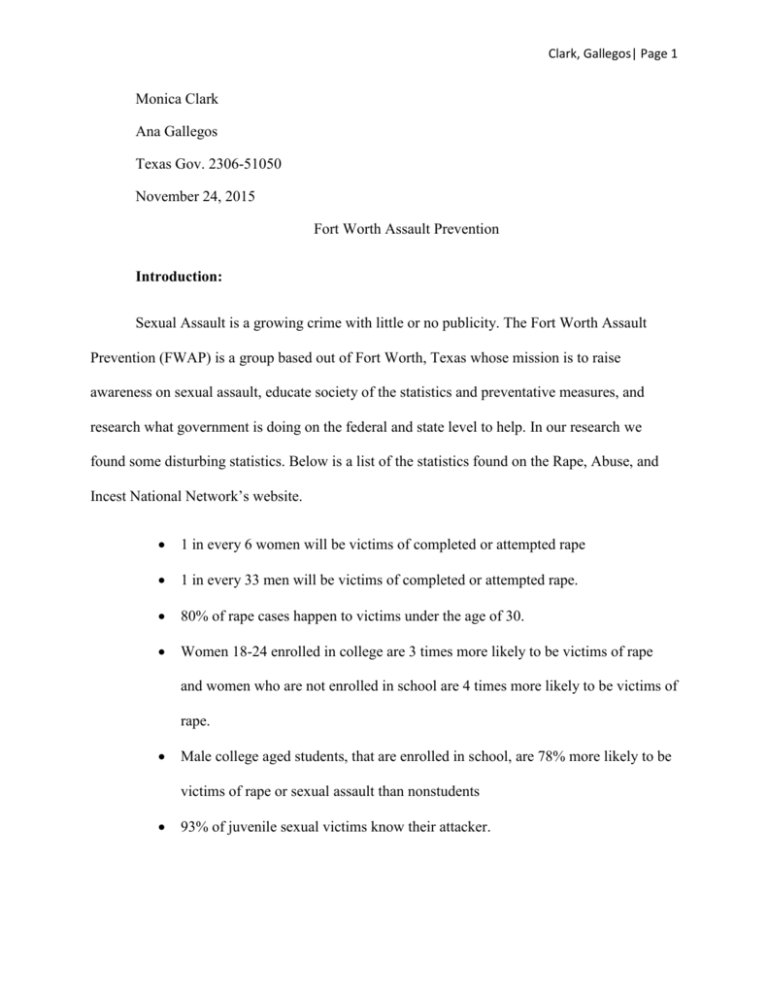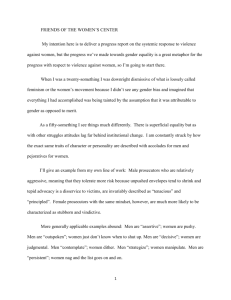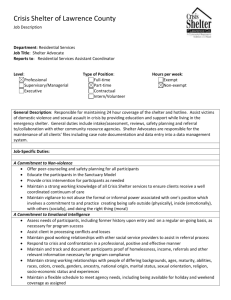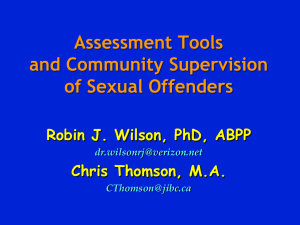
Clark, Gallegos| Page 1
Monica Clark
Ana Gallegos
Texas Gov. 2306-51050
November 24, 2015
Fort Worth Assault Prevention
Introduction:
Sexual Assault is a growing crime with little or no publicity. The Fort Worth Assault
Prevention (FWAP) is a group based out of Fort Worth, Texas whose mission is to raise
awareness on sexual assault, educate society of the statistics and preventative measures, and
research what government is doing on the federal and state level to help. In our research we
found some disturbing statistics. Below is a list of the statistics found on the Rape, Abuse, and
Incest National Network’s website.
1 in every 6 women will be victims of completed or attempted rape
1 in every 33 men will be victims of completed or attempted rape.
80% of rape cases happen to victims under the age of 30.
Women 18-24 enrolled in college are 3 times more likely to be victims of rape
and women who are not enrolled in school are 4 times more likely to be victims of
rape.
Male college aged students, that are enrolled in school, are 78% more likely to be
victims of rape or sexual assault than nonstudents
93% of juvenile sexual victims know their attacker.
Clark, Gallegos| Page 2
After reading these statistics we began researching what laws are in place to help raise
awareness as well as what laws are in place to help victims of sexual assault.
Background:
On October 12, 1984 under President Regan, The Victims of Crime Act was put
into law by the federal government. This act established a separate account, the Crime Victims
Fund, with in the U.S. treasury. The Crime Victims Fund was created to provide compensation to
victims of and survivors of various crimes for expenses acquired after those criminal acts were
formed. The Crime Victims Fund is not funded by tax dollars but instead it is receives its funding
through various federal criminal fines, penalties, etc. Under the Victims of Crime Act it also
established that the first 10 million dollars plus an amount, which is to be determined based off
of how much is deposited for the fiscal year, to go to child-abuse prevention and treatment
programs. However, victims do not apply to this fund directly. Instead, the Crime Victims Fund
distributes funding to various eligible victim-compensation programs established within the
states or the Crime Victims Fund will send money directly to the governor of the state, who will
then decide which programs are in need of the additional funding and will send in documentation
to provide proof that they money did in fact go to that program. For a victim-compensation
program to be eligible for funding they have to meet a list of requirements set by the Victims of
Crime Act.
However, it was not until 1994 when the first Violence Against Women Act was passed
by congress. This law was the first comprehensive federal package that was designed to end
violence against women. In the Violence Against Women Act it included provisions that focused
on prevention of rape and battering, funding for victim services and included the first federal
Clark, Gallegos| Page 3
criminal law against battering. This act included the requirement that every state afford full faith
and credit to orders of protection issued anywhere in the USA. Since 1994 the Violence Against
Women Act has been expanded and improved once in the year 2000 and again in 2005. The
Violence Against Women Act has improved the criminal just response to crimes such as sexual
assault against women. It has helped strengthen the federal penalties for repeat offenders,
mandating that victims, no matter their demographics, are not forced to pay the expense of their
own rape exams or for service of a protection order, as well as many more things. However, even
with these laws in place loopholes were found and victims of sexual assault have continued to
receive bills for their forensic exams. It was found that hospitals or organizations that completed
the rape exams were billing the victim’s insurance. Then when the insurance did not cover the
exam in its entirety the victim would then receive a bill.
Texas has a victim-compensation program such as The Texas Crime Victims’
Compensation Fund which is designed to help victims and their families pay for the financial
cost of crime that is not covered by insurance. This includes funding to pay for criminal court
costs, fees, and fines. The Texas Crime Victims’ Compensation Fund is administered by the
attorney general. The attorney general can then use the crime victims fund to reimburse law
enforcement agencies. However the attorney general did not have the authority to reimburse the
Department of Public Safety for the exams as well as to reimburse the individuals who pay the
costs of the sexual assault medical exams.
The author of House Bill 1446 which focused on using the crime victims fund for sexual
assault exams costs is Representative Tony Dale who was elected into office in 2012. Tony Dale
is Texas House Representative of district 136 which is over western Williamson County
including Cedar Park, Leander, and Brushy Creek as well as the portion of Austin that falls in
Clark, Gallegos| Page 4
Williamson County and part of Round Rock. He is a Republican party candidate and has been
recognized as a 2013 Lone Star Conservative Leader by the Texas Conservative Roundtable and
as a 2013 Courageous Conservative by the Texas Conservative Coalition. He currently serves on
the House committees on Energy Resources, Local and Consent Calendars, and Homeland
Security and Public safety. He formerly served as a member on the House Select Committee on
Child Protection. Tony Dale’s background in the committees he serves on and has served on
makes him an unlikely candidate to author a bill regarding sexual assault. However,
Representative Tony Dale was approached by a constituent of his who informed him that their
daughter had received a bill in the mail for her rape exam even though there are federal laws in
place that are to cover such expenses. Tony Dale reported in our interview with him that he then
approached the Texas Association Against Sexual Assault to see if this was an ongoing issue
with other sexual assault victims. After finding that it was, he asked permission from the Texas
Association Against Sexual Assault if he could be the representative to present a bill to
legislature that expanded the Texas crime victims fund to victims of sexual assault because he is
not an acting member of a committee that handles subjects such as sexual assault.
Components of the Bill:
House Bill 1446 was designed to expand the uses of the already established crime
victims’ compensation fund. The expansion gives the attorney general authorization to reimburse
the Department of Public Safety for the costs of medical exams for sexual assault victims as well
as to make payments to or on behalf of sexual assault victims who received medical
examinations. The Legislative Budget Board estimated that the bill would not have an impact on
general revenue related funds. However, it will have a negative impact of $5.4 million in the
fiscal year of 2016-2017 on the crime victims compensation fund. House Bill 1446 was
Clark, Gallegos| Page 5
supported by organizations such as the Texas Association Against Sexual Assault as well as the
Combined Law Enforcement Associations of Texas. The Texas Association Against Sexual
Assault is an organization whose mission is be the voice of the sexual assault movement in Texas
and to advocate for a Texas free from sexual violence. The Combined Law Enforcement
Associations of Texas is the largest law enforcement officers’ union in Texas as well as the
state’s largest legal services provider, specializing in representing law enforcement officers.
With the support of both the Texas Association Against Sexual Assault and the Combined Law
Enforcement Associations of Texas both parties effected by the lack of compensation for sexual
assault medical exams were able to have a voice in presenting why House Bill 1446 is a
necessity.
State Comparison:
In our research we found that Texas is not the only state who has had to revise and
expand existing laws to cover the medical expenses for sexual assault victims. One state that we
found was Louisiana. Democratic Representative Helena Moreno of District 93 in Louisiana
introduced two bills on the issue of sexual assault. The first bill introduced was House Bill 143
regarding using unclaimed gaming prizes to be used for the payment of health care services of
victims of sexual-orientated criminal offenses. The bill establishes a 90 day time period that a
winning ticket from any electronic gaming device will stay valid and allows for the use of
unclaimed gaming monies to be submitted to the Crime Victims Reparations Fund by the
licensee .The next bill Representative Moreno introduced was House Bill 835. House Bill 835
expanded the minimum retention period to at least one year, requiring hospitals or health care
providers to assign a code to the evidence container to identify the victim while maintaining
confidentiality. HB 835 also required that through DHH the “medical directors of each of its nine
Clark, Gallegos| Page 6
regional health service districts, to coordinate an annual sexual assault response plan for reach
district” and “requires each district to submit a proposed plan for review by the secretary of DHH
no later than October 1st of each year”. It also required the districts of Louisiana to incorporate a
Sexual Assault Response team and protocol and requires them to do this annually. The response
team would be responsible for inventorying all available resources, outline “the entity
responsible for the purchase of sexual assault collect kits and standards and procedures for
storage of the kits prior to use.” The resource team would also outline the procedures on
“handling and payment of medical bills related to the forensic medical examination”. Lastly the
resource team would outline “the standards and procedures for the transfer of sexual assault
collection kits for both reported and unreported crimes to the appropriate criminal justice agency
or local law enforcement agency”. House Bill 835 also established regulations on health care
providers and hospitals on the amount allowed to be charged for the examinations of sexual
assault victims. House Bill 835 became effective on June 23, 2015.
Both of the bills listed above are different than Texas House Bill 1446 because our state’s
bill was in regards to expanding the use of the already established crime victims compensation
fund. The Louisiana House Bill 143 expanded the outlets where their crime victims reparations
fund could receive funding from. House Bill 835 established a sexual assault response team for
each district and required them to establish procedures and protocols regarding sexual assault
examination kits. It also set a limit on how much hospitals and health care providers could
charge for such examinations. These bill are all different but the come with the common purpose
which is to expand the existing laws and create new laws to further aid victims of sexually
orientated crimes. The Louisiana house bills mentioned above were just enacted recently but are
believed to make a positive impact because the use of unclaimed gaming money will expand the
Clark, Gallegos| Page 7
funding of the crime victims reparations fund therefore permitting more money to help victims.
The establishment of the sexual assault response team insures that all medical examination kits
are held to the standard of DHH and it provides policy and procedures on how to transport kits to
the necessary agency. It also regulates the amount hospitals and health care providers are able to
charge allowing Louisiana officials to be able to more accurately project and budget for
upcoming years’ fiscal notes.
Journey of House Bill 1446 through the Legislative Process:
House Bill 1446 was first filed on February 16, 2015. After waiting a little less than a
month it was then read for the first time on March 4, 2015 to the House of Representatives and
was then referred to the Criminal Jurisprudence committee. After the third reading to the House
of Representatives on March 11, 2015 house bill 1446 was passed and then received by the
Senate on May 13, 2015 and read for the first time May 15, 2015, then referred to the Senate
Criminal Justice committee. House bill 1446 was then read for the third time and passed by the
Senate on May 26, 2015. It was voted in with 144 in favor and 6 other leaving 0 opposed. The
bill was then signed by the House of Representatives on May 31, 2015 and signed by the Senate
on June 1, 2015. Later was signed by the Governor on June 18, 2015. House bill 1446 became
effective September 1, 2015.
Group Analysis:
Fort Worth Assault Prevention found that the need for house bill 1446 was a necessary
action that Texas government needed to make. We found that with their effort of taking the
financial obligation off of sexual assault victims would help keep them from feeling revictimized. However, we do not agree with the sexual assault victims having to apply to receive
Clark, Gallegos| Page 8
payment for their medical exams and instead it should automatically be covered by the state. We
do realize that in doing this, it could cause some deficit which the government would have to
establish another way of helping fund the crime victims fund. We believe that the government is
headed in the right direction and hope that government officials will continue to strive to protect
and support the needs of those who have gone through traumatic crimes such as sexual assault.
Plan of Action:
The statistics for rape and sexual assault cases are alarming and continue to increase.
With the information we have found the Fort Worth Assault Prevention believes that raising
awareness and providing more programs on preventative measures we can see a change in these
growing numbers. First we would request that state governments establish a program set to
inform children of young ages in school of “No-No” areas in a sensitive and appropriate manner.
We would request that health officials such as the school nurse or outside health care personnel
come in to teach such subjects. We realize that parents will argue and say they should be the
ones teaching their children these subjects. However, the parent is the perpetrator to 80% of
juvenile victims of sexual assault. With this statistic, we believe that outside sources should
intervene so that young kids suffering such abuse can receive help faster. We also have found a
lack of supportive resources for victims.
The Fort Worth Assault Prevention will advocate for the government to implement a
sexual assault resource group like the Louisiana House Bill 835 established but require them to
come up with a plan of action on how to handle vary sexual assault cases as well as having them
set up other resources for the victims to see regarding mental health.
Clark, Gallegos| Page 9
Lastly, the Fort Worth Assault Prevention plans to establish a group which travels
throughout the state holding seminars at middle schools, high schools, colleges, and recreational
centers to talk about sexual assault and ways to recognize it as well as measures to attempt to
prevent sexual assault or rape. Prevention measures would include self-defense demonstrations.
Fort Worth Assault Prevention will continue to work and establish resources to help
victims as well as help prevent sexual assault from happening. We will also continue to advocate
for the government to continue to establish and expand laws that further protect victims
physically and financially. We hope with our programs that we create a safer Texas for all men,
women, and children.
Clark, Gallegos| Page 10
Work Cited
Dale, Tony. Personal Interview. 9 October 2015.
McOrmond-Plummer, Louise. Intimate partner sexual violence. Philadelphia: Jessica Kingsley
Publishers.2014.Print
"GOVERNOR STRENGTHENS DOMESTIC VIOLENCE LAWS AND SEXUAL ASSAULT
LAWS." States News Service 14 May 2010. Biography in Context. Web. 5 Nov. 2015.
TX H.B 1446. 2015-2016.84th Legislature." LegiScan. LegiScan LLC, 18 Jun. 2015. Web. 23
Oct. 2015. Web
Brodsky, Alexandra. "The emotional and financial burdens of sexual assault." Washington Post
18 Nov. 2014. Biography in Context. Print. 5 Nov. 2015.
Witt, Emily. "Despite Promises, Some Rape Victims Stuck Paying Exam Bills." Top Stories
RSS. Huffington Post, 30 July 2009. Web. 24 Nov. 2015.
"Crime Victims' Compensation: Who Is Eligible?" Crime Victims. N.P., n.d. Web. 24 Nov. 2015.
"House Vote on HB 1446." Open States. Sunlight Foundation, 12 May 2015. Web.
"Violence against Women Act." Springer Reference (2011): n. page 24. 14 January
2014. Web. Dec.2014
Robert, Thomas. “Louisiana House of Representatives." Louisiana House of Representatives.
N.P., n.d. Web. 24 Nov. 2015.
Dale, Tony. "Texas House of Representatives.”: Macias, john Member News Releases. N.P., 15
May 2015. Web. 24 Nov. 2015.
Clark, Gallegos| Page 11







